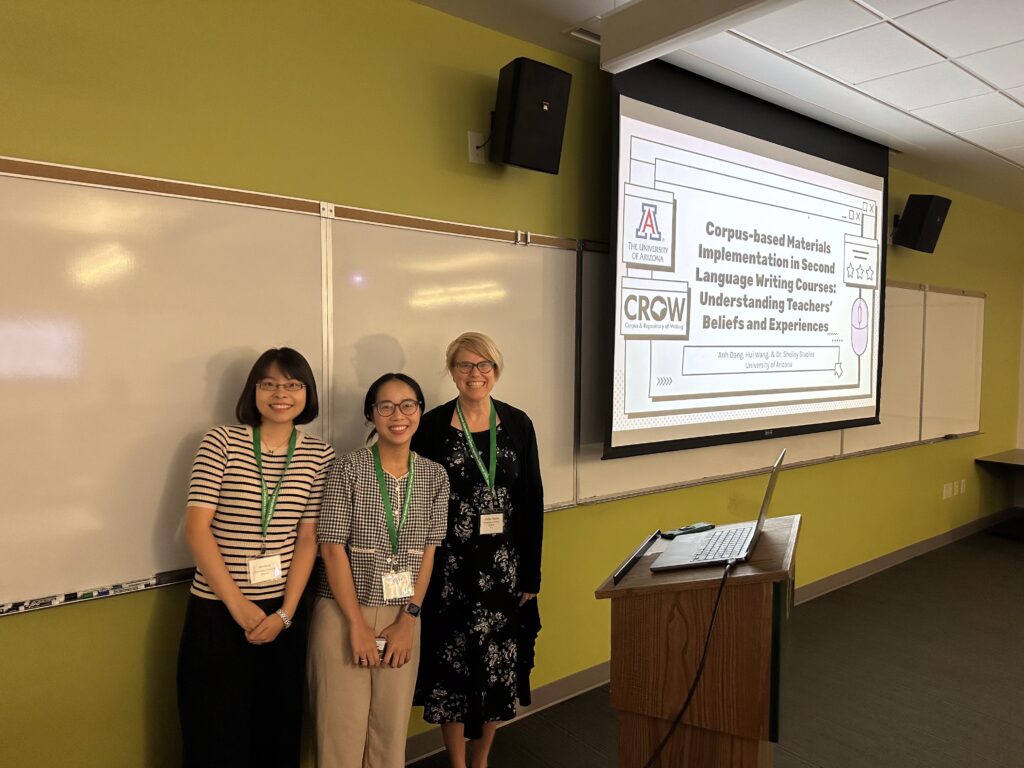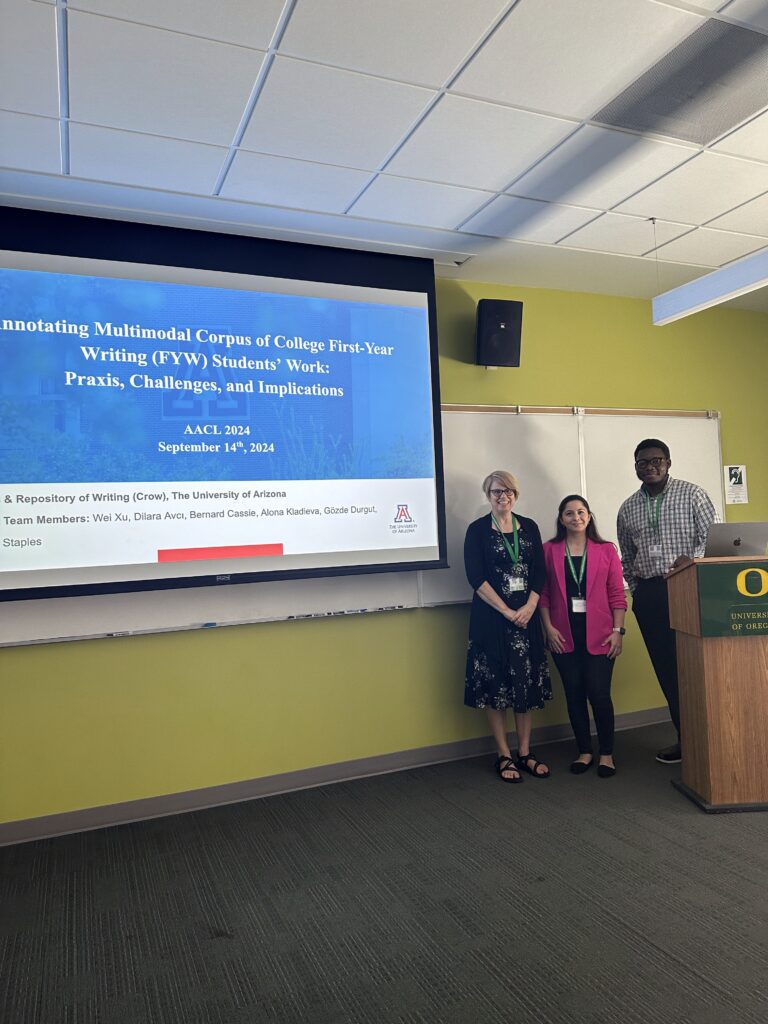Earlier this fall, six Crow members made their way to Eugene, Oregon to attend the 16th International American Association for Corpus Linguistics Conference (AACL). This biennial conference focuses on corpus based language teaching, corpus analysis, and corpus related tools and methods. This year, AACL took place on September 13-15 and was hosted by the Linguistics Department of the University of Oregon. Dr. Shelley Staples, Dr. Randi Reppen, Dilara Avci, Bernard Cassie, Anh Dang, and Hui Wang all attended and presented at the conference. I had the opportunity to speak with Dr. Staples, Mr. Cassie and Ms. Avci about their experiences at AACL.
Dr. Staples describes AACL as her “home conference,” and she makes sure to attend each year. For Staples, this conference is not only an opportunity to share her current research, but also allows her to reconnect with old friends and catch-up with fellow researchers. This year, Staples advised multiple Crow-related research projects and presented her own research. Her work on variation in first-year writing is the subject of a new book she currently has in the works.
Research Studies & Presentations
Anh Dang, Hui Wang, Shelley Staples, Corpus-based materials implementation in second language writing courses: understanding teacher’s beliefs and experiences.
PhD students Ahn Dang and Hui Wang collaborated with Staples as part of Dang’s PhD dissertation. With a focus on data-driven learning, this study explores teachers’ process of using corpus-based materials in second-language writing courses at the University of Arizona. The three researchers collected data through focus groups, instructor surveys, and observations of classrooms in which Crow corpus teaching materials were implemented, although this talk focused on the classroom observations. Using the Technological Pedagogical Content Knowledge framework (TPACK) to analyze their data, they found that the teachers’ implementation of these materials required teachers to use all of these different aspects of TPACK, but perhaps in different ways than expected, since the materials remove the need for teachers to introduce students to how corpus technologies are used.

Shelley Staples, Variation Across First Year Writing: A Multidimensional Analysis
This research, which is part of Staples upcoming book, goes beyond the common view of First Year Writing (FYW) as a way to teach the basics of academic writing and examines these kinds of texts from a more empirical perspective. By using factor-analysis to identify patterns of co-occurrence among language features in FYW assignments, the study aims to investigate the linguistic and functional variation in these texts. Staples utilized a subcorpus of over 13,000 texts from the Crow Corpus for this research.
While Staples has been a long-time attendee of AACL, for University of Arizona PhD students Bernard Cassie and Dilara Avci, this was their first time attending the conference. Both Cassie and Avci presented research they conducted in collaboration with other Crow members.
Hui Wang, Bernard Cassie, Alona Kladieva, Samuel Gnaore, Anh Dang, Shelley Staples, Gamifying corpus-based materials for second language writing classes: From design to practice
This study, which is part of Hui Wang’s PhD dissertation, investigates how language learning materials can be transformed through the addition of game-based characteristics, and how that leads to higher learning-based outcomes. Researchers used Crow-corpus texts to develop game-based educational activities, such as Jeopardy and find-and-replace. These games were implemented into first-year international writing courses at the University of Arizona. Instructors and students reported positive effects of the materials through survey data.
Wei Xu, Dilara Avci, Gözde Durgut, Bernard Cassie, Alona Kladieva, Shelley Staples, Annotating multimodal corpus of college first-year writing (FYW) students’ work: Praxis, challenges, and implications
Corpus studies commonly focus on linguistic elements, but this study examined how first-year writing students utilized multimodality in foundational writing courses. It primarily focused on the use of non-verbal elements to create meaning and engage audiences. By developing a codebook to represent these elements and annotate these texts, the team was able to identify the prevalence of multimodal features, such as images, memes, and emojis and how these varied across assignment types (e.g., infographics and reflections).

Crowbirds on AACL
In addition to discussing their research, Cassie and Avci shared their personal experiences at AACL. While it was much smaller than previous conferences they had attended, both Crowbirds said it was an incredibly rewarding experience. The small-scale and intimacy of the event fostered a greater sense of community and engagement not often seen in larger academic conferences. Cassie, who is currently in the first year of his PhD program, noted that AACL was a great opportunity to speak with students in similar programs, as well as professors and researchers who share his linguistic interests. He noted his excitement at “being able to pick their minds.” Cassie named Jesse Egbert, who presented on the text-linguistics revolution, as his favorite plenary speaker at the conference. Cassie also met Dr. Shannon Fitzsimmons-Doolan, a linguistics professor at Texas A&M, who invited him to give a guest lecture for her graduate students.
Avci, a second-year PhD student, shared similar sentiments when talking about her experience at the conference. She described the friendly, welcoming atmosphere of AACL and talked about how incredible it was to be able to meet so many of the researchers whose work she followed. She could finally place faces to the names she had only read and heard about. When asked about her most memorable experience, like Cassie, Avci talked about being able to converse with other graduate students. Describing the experience as “finding your own people,” she was able to ask for advice, bond over similar interests, and even initiate future research collaborations.
Both Avci and Cassie found their time at AACL to be encouraging, as it solidified their passion for linguistics, especially as early PhD students. For younger Crowbirds who are interested in attending conferences and presenting research, they offered some insightful advice. Avci expressed the importance of seeking out research opportunities, being involved in research as early as possible, and using coursework strategically to apply to your presentations. Cassie advises future conference attendees to engage with others, take initiative, and apply any research related feedback they receive.
The 2024 AACL conference was a great success for our Crowbirds. From sharing their work to connecting with other researchers, everyone found value in attending this year’s event. Crow researchers will be sure to make their presence known at the next AACL conference in 2026– just one of the many things Crow has to look forward to in the coming years.